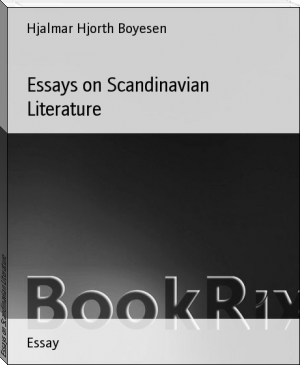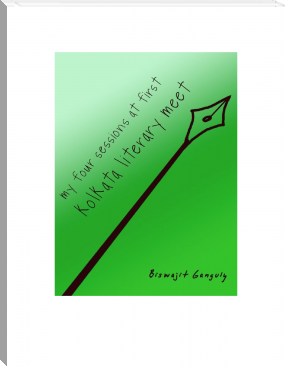Essays on Scandinavian Literature, Hjalmar Hjorth Boyesen [best ebook reader ubuntu txt] 📗

- Author: Hjalmar Hjorth Boyesen
Book online «Essays on Scandinavian Literature, Hjalmar Hjorth Boyesen [best ebook reader ubuntu txt] 📗». Author Hjalmar Hjorth Boyesen
The softness, the sweetness, the juvenile innocence of Danish romanticism found their happiest expression in him; but also the superficiality, the lack of steel in the will, the lyrical vagueness and irresponsibility. If he did not invent a new literary form he at all events enriched and dignified an old one, and revealed in it a world of unsuspected beauty. He was great in little things, and little in great things. He had a heart of gold, a silver tongue, and the spine of a mollusk. Like a flaw in a diamond, a curious plebeian streak cut straight across his nature. With all his virtues he lacked that higher self-esteem which we call nobility.
CONTEMPORARY DANISH LITERATURE
The late Romantic authors of Denmark who lived on the traditions of Oehlenschläger's time and the æsthetical doctrines of J. L. Heiberg, have gradually been passing away; and a new generation has grown up, which, though it knows Joseph, has repudiated his doctrine. A period of stagnation followed the disappearance of the Romanticists. The Sleswick-Holstein war of 1866, and the consequent hostility to Germany, cut off the intellectual intercourse between the two countries which in the first half of the century had been lively and intimate; and as, for a while, no new ties were formed, a respectable dulness settled upon the little island kingdom. People lived for the concerns of the day, earned their bread and butter, amused themselves to the best of their ability, but troubled themselves very little about the battles of thought which were being fought upon the great arena of the world. The literary activity which now and then flared up spasmodically, like flames over a smouldering ash-heap, flickered and half-expired for want of fresh sustenance. A direfully conventional romanticist, H. F. Ewald (1821-1892), wrote voluminous modern and historical novels, the heroines of which were usually models of all the copy-book virtues, and the heroes as bloodless as their brave and loyal prototypes in "Ivanhoe" and "Waverley." Instead of individualizing his _dramatis personæ_ this feeble successor of Ingemann and Walter Scott gave them a certificate of character, vouching for their goodness or badness, and trusting the reader to take his word for it in either case. Like many another popular novelist, he varnished them with the particular tint of excellence or depravity that might suit his purpose, stuffed their heads with bran and their bellies with sawdust, but troubled himself little about what lay beneath the epidermis. There was something _naïve_ and juvenile in his view of life which appealed to the large mass of half-educated people; and the very absence of any subtle literary art tended further to increase his public. Many of his books, notably "The Youth of Valdemar Krone" (_Valdemar Krone's Ungdomshistorie_), "The Swedes at Kronborg" (_Svenskerne paa Kronborg_), have achieved an extraordinary success. The former deals with contemporary life, while the latter expurgates and embellishes history after the manner of Walter Scott. Two subsequent novels, "The Family Nordby" and "Johannes Falk," are, like all of Ewald's writings, pervaded by a robust optimism and a warm Danish sentiment, which in a large measure account for their popularity with the public of the circulating libraries.
A lesser share of the same kind of popularity has fallen to the lot of an author of a much higher order--Wilhelm Bergsöe (born 1835). His voluminous novel "Fra Piazza del Popolo" (1860) made a sensation in its day, and "From the Old Factory" (1869), which constructively is a maturer book, is likewise full of fascination. The description of the doings of the artistic guild in Rome, which occupies a considerable portion of the former work, is delightful, though intermingled with a deal of superfluous mysticism and romantic entanglements which were then held to be absolutely indispensable. "In the Sabine Mountains" (1871), the scene of which is laid in Genazzano during the struggle for Italian independence, is a trifle too prolix; and its effect is lessened by the old-fashioned epistolary form. Signor Carnevale, the revolutionary apothecary, is, however, a very amusing figure, and would be still better if he were not caricatured. The tendency to screw the characters up above the normal--to tune them up to concert pitch as it were--interferes seriously with the pleasure which the book otherwise might yield.
The conception of art as something wholly distinct from and above nature animates all Bergsöe's productions. The theory of fiction which R. L. Stevenson has so eloquently propounded has found an able practitioner in him. For all that, I am indebted to Bergsöe's two Italian romances for a great deal of enjoyment, the afterglow of which still warms my memory. But that was long ago. A young man is apt to enjoy in a book quite as much what he himself supplies as that which the author has deposited therein. Each word is a key which unlocks a store of imprisoned emotions. The very word Italy has a magic which imparts to it a charm even in the geography. And Bergsöe, though he works, without suspicion of its decrepitude, the ancient machinery of Italian romance, is unaffectedly eloquent and unsophistically entertaining. The historic whisperings which he catches from the names, the ruins, the facial types, and the very trees and grass of Genazzano invest his letters from that picturesque neighborhood with a certain beautiful glow of color and a dusky richness of decay. The autobiographical form imposes, to be sure, an increasing strain on the reader's credulity, as the plot thickens, and we find ourselves, half-unexpectedly, involved in a lurid tale of monks, priests, disguised revolutionists, cruel, mercenary fathers, etc., and the Danish author playing his favorite _rôle_ of _deus ex machina_. Still more incredible is the part of benevolent Providence which he assigns to himself in "The Bride of Rörvig," where he saves the heroine's life by restoring to her a ring given to her lover, and thus assuring her that he is alive when she believes him dead. The autobiographical story (especially when the writer is a mere convenient supernumerary, designed, like the uncle from America in the old-fashioned melodrama, to straighten out the tangled skein), is apt to involve other difficulties than the mere embarrassment of having to distrust the author's assertion, or censure his indiscretions. The illusion is utterly spoiled by that haunting _arrière pensée_ that this or that writer, whom you know perhaps at first or second-hand, or whose features, at all events, are familiar to you from pictures, never could or would have played the more or less heroic _rôle_ with which he here delights to impose upon you.
Altogether the best book which Bergsöe has written is the autobiographical romance "From the Old Factory," the scene of which is laid in Denmark. This book evidently contains a great deal of genuine reminiscence, and is therefore devoid of that air of laborious contrivance and artificial intrigue which brings the foregoing novels into such unpleasant relationship with Wilkie Collins and his _genre_. The incidents of the hero's boyhood in the old porcelain factory, and his uncle's agitating experiments for the rediscovery of a lost process of glazing are saner and soberer and lie closer to the soil of common experience than the exploits of monks and pirates and revolutionists.
Among the notable men of the expiring Danish romanticism Meyer Aaron Goldschmidt (1819-1886) holds a leading position. A comic paper, _Corsaren_, which he edited (1840-1846) made a tremendous stir in its day; and its scathing wit and satire were not without influence upon current events. His two novels, _En Jöde_ (1845), _Hjemlös_ (1857), and a large number of clever novelettes (_Ravnen_, _Arvingen Flyveposten_, etc.), are full of psychological subtleties, and often charmingly told. _Flyveposten_ ("The Flying Mail") was translated into English (Boston and Cambridge, 1870) but attracted no particular attention. For all that, Goldschmidt, in spite of occasional prolixity, stands the test of time remarkably well. His Jewish stories, notably _Maser, Aron og Esther_, and _En Jöde_, contain a higher order of work, though less dramatically effective, than that of Sacher-Masoch, and Emil Franzos, and the later Ghetto romancers. Goldschmidt's double nationality, as a Danish-born Jew, indicates his position and the source from which he drew his weakness and his strength. As a Jew he saw and judged the Danish character, and as a Dane he saw and judged the Jewish character with a liberality and insight of which no autochthon would have been capable. For all that his tales aroused anything but friendly feelings among his own people. They felt it to be a profanation thus to expose the secluded domestic and religious life of the children of Israel. It is to this sentiment that Dr. Brandes has given utterance in his protest against "perpetually serving up one's grandmother with sauce piquante."
An author who is born into an age of transition, when old faiths are passing away and new ones are struggling for recognition, is placed in a serious dilemma. Where he makes his choice by mere temperamental bias, he is apt to miss that element of growth which is involved in every spiritual struggle. But if, as is so frequently the case, he finds his choice in a measure made for him, his education, kinships, and worldly advantage identifying him with the established order, it takes a tremendous amount of courage and character to break away from old moorings and steer, without other compass than a sensitive conscience, toward the rosy dawn of the unknown. There was a desperate need of such men in Denmark in the seventies, when the little kingdom was sinking deeply and more deeply into a bog of patriotic delusion and spiritual stagnation. An infusion of new blood was needed--a re-establishment of that circulation of thought which keeps the whole civilized world in vital connection and makes it akin. No country can cut itself off from this universal world-life without withering like a diseased limb. The man who undertook to bring Denmark again into _rapport_ with Europe was Dr. Georg Brandes, whom I have characterized at length in another essay. It was his admirable book, "The Men of the Modern Transition" (translated into German under the title _Moderne Geister_) which impelled me, some years ago, to make the acquaintance of the three authors who represent whatever there is of promise in contemporary Danish literature, viz., Sophus Schandorph, Holger Drachmann, and J. P. Jacobsen. The last named, who died (1884) in the flower of his young manhood, is, perhaps, not in the strictest sense contemporary. But he is indispensable to the characterization of the group.
Widely different as these three men are in almost everything, they have this in common, that they have deeply breathed the air of the nineteenth century; and they all show more or less the influence of Brandes. That this influence has been direct and personal seems probable from the relation which they have sustained to the revolutionary critics. Of this I am, however, by no means sure. Mr. Jacobsen, who was by profession a botanist, and translated Darwin into Danish, no doubt came by his "advanced views" at first hand. In the case of Schandorph it is more difficult to judge. He is an excellent linguist, and may have had access to the same sources from which Brandes drew his strength. Drachmann is so vacillating in his tendencies that he refuses to be permanently classified in any school of art or thought. Of the three, Schandorph seems altogether the maturest mind and furnishes the most finished and satisfactory work. In his novel "Without a Centre" (_Uden Midtpunkt_) the reader feels himself at once face to face with an interesting and considerable personality. He has that sense of surprise and delighted expectation which only the masters of fiction are





Comments (0)